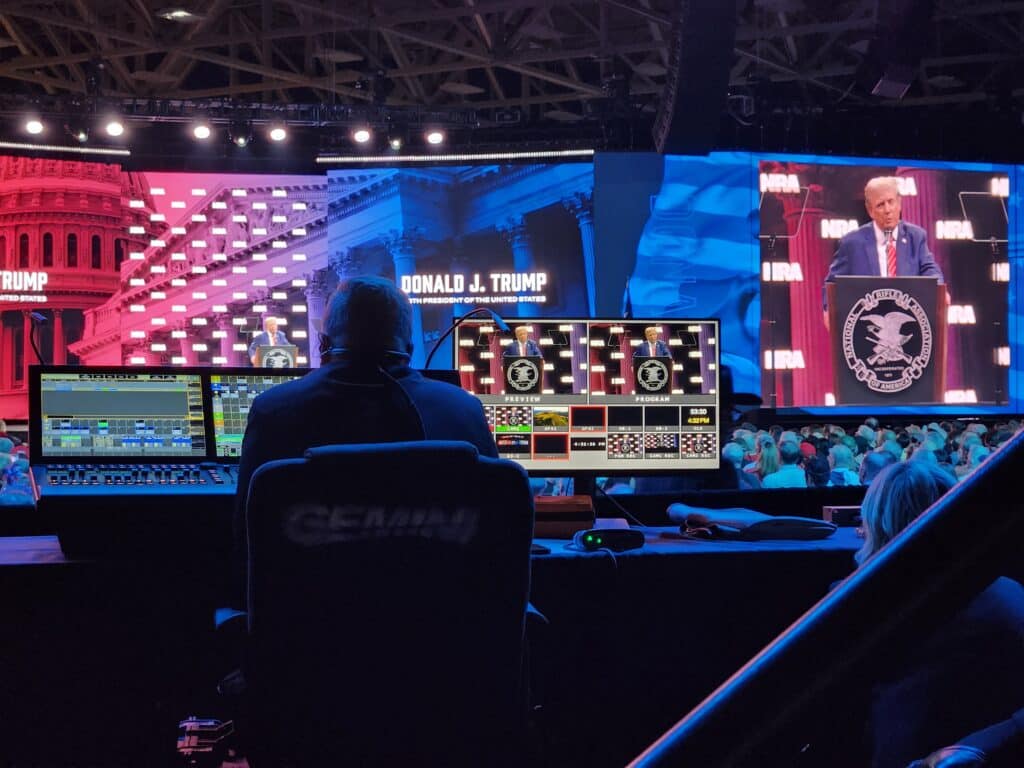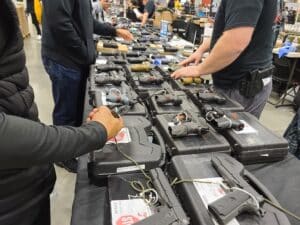This was not a good week for the gun-rights movement. The presidential election became a choice between a person who can’t legally own a gun and one who wants to further restrict gun ownership for everyone. The one Republican primary where gun policy was the top issue saw the incumbent edge out his upstart guntuber challenger.
Contributing writer Jake Fogleman takes a close look at that race to try and get a feel for how bad the loss was. And, in that case, there’s good reason to think it still represents a worthwhile showing of strength for gun activists. Still, only a win is really a win.
It’s harder to put a positive spin on Donald Trump’s convictions from a gun voter’s point of view. But my focus is more on how little anyone even discussed the clear possibility the ostensibly pro-gun candidate might not be legally allowed to touch a gun by election day. Of course, I’ve talked about it multiple times–even as far back as October. But none of his primary opponents or any of the gun-rights groups even broached the subject.
Even if you think gun voters should’ve supported him given that possibility, it’s remarkable there wasn’t even a discussion on this point. The gun-rights movement ended up just sleepwalking into a situation where the candidate its backing can’t even touch a gun. Pretty wild stuff.
Plus, federal litigator Gabriel Malor joins the podcast to discuss the practical implications of Donald Trump becoming a prohibited person.

Analysis: What the TX-23 Runoff Says About the Gun Vote [Member Exclusive]
By Stephen Gutowski
Even in defeat, gun-rights voters proved they can still make Republican candidates they target sweat.
Incumbent Congressman Tony Gonzales (R.) narrowly staved off a significant political upset Tuesday night in the primary runoff for Texas’ 23rd District. With all precincts reporting, the final vote count showed Gonzales besting his challenger, popular YouTuber and political novice Brandon Herrera, by just 407 votes.
That razor-thin margin of victory was surprising. The Gonzales campaign outspent Herrera’s by a margin of more than three to one, according to OpenSecrets, while outside spending by SuperPACs favored Gonzales 22-to-1.
What’s more, the unexpected nail-biter was primarily brought about by Second Amendment activists. Unlike other recent GOP showdowns, gun politics was the dominant theme of the race.
Gonzales, whose sprawling district includes Uvalde, was the only Texas House Republican to vote in favor of the 2022 Bipartisan Safer Communities Act (BSCA), the first federal law to expand the group of people prohibited from owning guns in nearly three decades. While that vote did not cost him in his first re-election campaign that year—he comfortably defeated his general election challenger by 17 points—it did sow the seeds of conservative opposition. The Republican Party of Texas formally censured Gonzales, in part over that vote, last March.
It also prompted Herrera to throw his hat in the ring to challenge him.
Herrera, known as The AK Guy on his firearms-focused YouTube channel that boasts more than 3.43 million subscribers, launched his campaign in direct response to Gonzales’s vote supporting the BSCA. Herrera summed up the impetus for his run at a gun-rights rally in Denver in March.
“If you vote against our interests, if you vote against gun rights, if you vote against the Constitution, we will challenge you, we will primary you, and we will win,” he said. “We will take your fucking job.”
During his campaign, he ran heavily on gun issues, pledging to support “national concealed carry legislation” and to block “any effort to pass Red Flag laws or any new firearms restrictions.” His campaign website also touted his ties with advocacy groups like the National Association for Gun Rights, the Firearm Policy Coalition, and Gun Owners of America on its home page.
That Herrera’s gun-heavy strategy got him within spitting distance of unseating an incumbent in a traditionally moderate district highlights the influence gun voters still have in the party.
Of course, the race did end up being about more than simply Gonzales voting for a gun-control bill. As it progressed to the runoff, the race also became a vehicle for warring factions within the GOP to duke it out. Gonzales drew support from party leadership, like House Speaker Mike Johnson and Texas Governor Greg Abbott. Meanwhile, Herrera received endorsements from MAGA firebrands like Bob Good and Matt Gaetz, the latter of whom actually joined Herrera at campaign events.
Additionally, the fact that Herrera still lost does take some of the shine off the warning not to cross gun-rights activists. Moral victories are not the same as actual victories.
Gun-control advocates, for example, took Gonzales’ narrow win as a sign of the gun-rights movement’s waning political influence.
“Not long ago, the gun lobby had an iron grip on the GOP because of their unmatched power to influence primary elections,” Chris Harris, Giffords’ Vice President of Communications, tweeted. “That’s simply not the case anymore. Remember this next time they make threats over votes.”
However, the race did not draw the full scope of the gun-rights movement’s political mobilization and fundraising efforts. Herrera’s candidacy was backed by the National Association for Gun Rights, which contributed $7,050 to his campaign and whose SuperPAC spent $10,657 opposing Gonzales, according to OpenSecrets. Meanwhile, Gun Owners of America’s SuperPAC contributed another $47,682 in outside spending supporting Herrera.
The NRA, the largest political spender of them all, stayed out of the race. Though the scandal-plagued organization has faced dwindling membership and fundraising challenges in recent years, its political arms still dwarf every other major gun-rights group combined. It also has a track record of driving successful get-out-the-vote efforts among gun voters in a way other groups do not.
Despite the loss, the fact that a gun-rights activist turned political upstart came within recount territory of a multi-term incumbent in a moderate district–all without the institutional backing of the NRA and opposition from Republican leadership–suggests the gun-rights movement still wields plenty of power inside the GOP.
Podcast: The Practical Realities of Trump Becoming a Prohibited Person [Member Early Access]
By Stephen Gutowski
This week, we saw the first felony conviction of a former president.
Obviously, the verdict will have all sorts of complications and consequences for Donald Trump. One of them is the fact he’ll now be a prohibited person. He won’t be allowed to buy or even possess guns.
To discuss the details of what that will look like, we have federal litigator and legal commentator Gabriel Malor on the show. He walks through how Trump’s New York convictions trigger the federal felon-in-possession ban and the same ban in his home state of Florida. He also talks about how Trump can legally transfer his guns to friends or family but also can’t be in a position where he even just has access to them.
That might cause issues with his armed Secret Service detail, but Malor said that’s unlikely.
He also explained how Trump might get his gun rights back. The most likely course is to win on appeal, but he could also try to have his record expunged after serving his sentence. Or, one of the Second Amendment challenges brought by a similarly situated non-violent felon could undo the federal ban altogether.
You can listen to the show on your favorite podcasting app or by clicking here. Video of the episode is available on our YouTube channel. Reload Members get access on Sunday, as always. Everyone else can listen on Monday.
Plus, on the news update, contributing writer Jake Fogleman and I discuss the political fallout of Trump’s convictions for the gun debate. We also talk about the Supreme Court’s unanimous ruling in favor of the NRA’s free speech claims against New York officials. Plus, we cover the narrow loss of a prominent guntuber who tried to unseat an incumbent Republican over a gun control vote in a Texas congressional primary. Audio is here. Video is here.

Analysis: This Was Always a Possibility, But Garnered Little Attention From Gun Activists [Member Exclusive]
By Stephen Gutowski
Donald Trump was convicted of 34 felonies on Thursday. He can no longer possess guns. That outcome was certainly foreseeable, given how many felony indictments he faced and still does. But this eventuality wasn’t broached by gun-rights groups or Trump’s primary opponents in the leadup to his nomination.
This stemmed from the general, inexplicable decision not to make guns a point of contention in the Republican primary.
While some of Trump’s opponents, such as Florida Governor Ron Desantis, seemed to be setting up a record to run to his right on gun policy, nobody did very much at all to go after him on the issue. The topic was basically absent from the Republican debates, where Trump himself was also absent. The former president doubling down on his bump stock ban, whose constitutionality is currently being challenged at the Supreme Court, didn’t garner much pushback from his opponents either.
As with most other issues, Trump’s opponents spent more time going after each other’s vulnerabilities than the frontrunner’s flaws.
It’s not as though there was nothing to exploit. Trump certainly has a track record of pro-gun accomplishments he can and does tout, including appointing three of the six justices from the majority in 2022’s landmark New York State Rifle and Pistol Association v. Bruen case. But, in addition to the bump stock ban, Trump has also made a series of statements on being open to a myriad of different gun restrictions.
In his book “The America We Deserve,” Trump expressed support for an “assault weapons” ban. After the El Paso shooting, he reportedly had to be talked out of supporting a ban on AR-15s and other popular firearms. After the Parkland shooting, he had a public discussion at the White House with a bipartisan group of Senators where he said, “…take the guns first, go through due process second” when talking about the potential of supporting a “red flag” law.
In the meeting, Trump’s Vice President Mike Pence said the laws can “give families and give local law enforcement additional tools if an individual is reported to be a potential danger to themselves or others.”
“Allow due process so no one’s rights are trampled,” Pence said. “The ability to go to court, obtain an order, and then collect not only the firearms but any weapons in the possession of that individual…”
“Or, Mike, take the firearms first and then go to court,” Trump interrupted. “Because, a lot of times, by the time you go to court, it takes so long to go to court, to get the due process procedures—I like taking the guns early. Like in this crazy man’s case, that just took place in Florida, he had a lot of firearms, they saw everything—to go to court would have taken a long time, so you could do exactly what you’re saying, but take the guns first, go through due process second.”
Ultimately, his support for working with Democrats to enact new gun restrictions didn’t survive the announcement of his first impeachment. But none of his opponents, or the gun-rights groups for that matter, tried to make these vulnerabilities on gun policy a major issue in the primary campaign.
Then, of course, there was the potential for his felony charges to turn into felony convictions. The indictments alone made it illegal for him to obtain new guns, but there was basically no discussion of this fact. Even after a false claim by his campaign that he’d bought a gun with his face on it at a campaign stop brought the issue into the public eye, there wasn’t a peep from his opponents or any of the major gun-rights groups.
Now, this is all likely because the idea Trump had done nothing wrong, or at least nothing criminal, in attempting to undo the 2020 election results or keeping classified documents or covering up an affair ahead of the 2016 election became dogma within the Republican party pretty quickly. But it’s surprising none of the people running against him really bothered to challenge that dogma. And it’s remarkable gun-rights activists were silent about how it might hurt their cause if any of those cases went against Trump, too.
After all, even if most gun advocates thought the charges wouldn’t stick, it seems only prudent to have at least some discussion of what would happen if they did.
Instead, voters are stuck with a choice between a man who can’t own guns and a man who wants to severely restrict their ownership. It’s a choice many might not have realized they’d be forced to make. None of the gun-rights groups or Republican alternatives brought it up (although some gun news publications did).
Perhaps having to make that choice is worth it for those who wish to see Trump exonerated. I’m sure there will be gun-owning Trump supporters who think sticking with him through the legal battles is more important than nearly anything else. But not even broaching that debate makes little sense in hindsight.
That’s it for now.
I’ll talk to you all again soon.
Thanks,
Stephen Gutowski
Founder
The Reload







